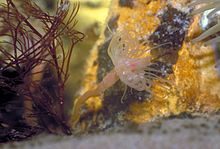Ectopleura larynx
| Ectopleura larynx | |
|---|---|

| |
| Ectopleura larynx | |
| Scientific classification | |
| Domain: | Eukaryota |
| Kingdom: | Animalia |
| Phylum: | Cnidaria |
| Class: | Hydrozoa |
| Order: | Anthoathecata |
| Family: | Tubulariidae |
| Genus: | Ectopleura |
| Species: | E. larynx
|
| Binomial name | |
| Ectopleura larynx Ellis & Solander, 1786
| |
| Synonyms | |
| |
Ectopleura larynx, or ringed tubularia, is a hydroid in the family Tubulariidae.[1]
Description[edit]
Ectopleura larynx forms colonies that are usually no more than 6 centimetres (2+1⁄2 inches) high.[2] It is described as:
The stems are tubular, with a yellowish coloured tegument and are branched at the base. The polyp colour is pale pink through to red, and consists of a central circlet of oral tentacles surrounded by paler but larger aboral tentacles[3][full citation needed]
Distribution and habitat[edit]
E. larynx is found throughout the British Isles and is common in the Northern Atlantic Ocean.[4]
It is usually found on rocks or attached to algae.[5] It is most common in shallow water, fouling piers and on the undersides of boats; in the British Isles, seas surrounding Great Britain, and the Americas. E. larynx grows in colonies and can tolerate exposed habitats and strong water currents.[6]
References[edit]
- ^ Telnes, K. "Ringed Tubularia - Tubularia larynx". seawater.no. Retrieved 2016-12-19.
- ^ "WoRMS - World Register of Marine Species - Tubularia larynx Ellis & Solander, 1786". marinespecies.org. Retrieved 2016-12-19.
- ^ "hydrozoans and Tubularia Larynx"
- ^ Picton, B.E. & Morrow, C.C. "Tubularia larynx Ellis & Solander, 1786. [In] Encyclopedia of Marine Life of Britain and Ireland". habitas.org.uk. Retrieved 2016-12-19.
- ^ Tubularia Larynx Ellis & Solander, 1786." Tubularia Larynx - Marine Life Encyclopedia. Encyclopedia of Marine Life of Britain and Ireland. Web.
- ^ Hughes, R. G. "The Life-history of Tubularia Indivisa (Hydrozoa: Tubulariidae) with Observations on the Status of T. Ceratogyne." Tubularia.
